8 Popular Cold Meds at Risk of Being Banned After New FDA Ruling

Cold and flu season is gearing up to take the U.S. by storm. During the fall and winter, many of us expect to wake up to stuffy noses and scratchy throats, but you may have a harder time finding medications to ease your symptoms this year. That’s because an advisory panel for the U.S. Food and Drug Administration (FDA) just deemed a common decongestant to be ineffective—and it’s found in many of the OTC medication you likely turn to. Read on to discover eight popular cold meds that could soon be banned.
RELATED: 2 Medications Recalled After Major Mix-Up: “Serious Adverse Events,” FDA Warns.
The FDA has been investigating a common decongestant.
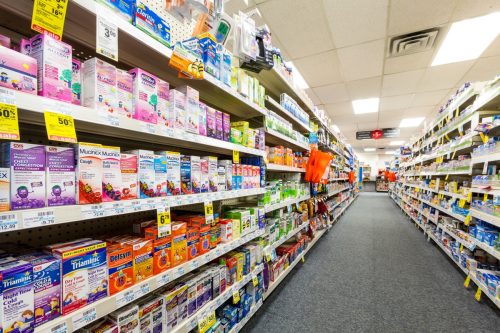
Phenylephrine is a nasal decongestant that is found as an ingredient in many common cold and allergy medications, according to the U.S. National Library of Medicine’s MedlinePlus. It was first approved by the FDA for over-the-counter (OTC) use in the 1970s, per NBC News.
But on Sept. 11, the agency’s Nonprescription Drugs Advisory Committee (NDAC) started a two-day advisory meeting to reevaluate the medication’s effectiveness. As explained in a briefing document posted before the meeting, the FDA said that the advisory panel would be discussing new efficacy data to determine whether oral phenylephrine should be able keep its “Generally Recognized as Safe and Effective” (GRASE) classification.
RELATED: Ozempic Patients Report Debilitating New Side Effect: “Wish I Never Touched It.”
The agency’s advisory board now says it doesn’t work at all.
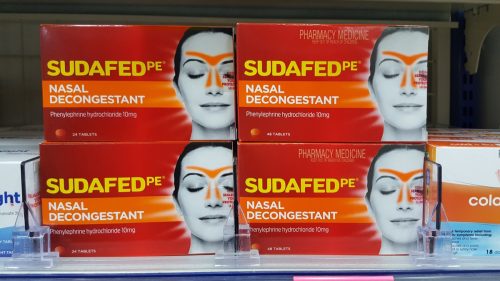
After reviewing and discussing the available data, the NDAC held a vote among its members about the effectiveness of phenylephrine on Sept. 12. The specific question voted on was, “Do the current scientific data that were presented support that the monograph dosage of orally administered phenylephrine is effective as a nasal decongestant?”
The committee’s 16 members unanimously voted no, determining that the ingredient is ineffective and no better than a placebo, The New York Times reported.
“I think we clearly have better options in the over-the-counter space to help our patients, and the studies do not support that this is an effective drug,” Maria Coyle, chairwoman of the NDAC and an associate professor of pharmacy at Ohio State University, said in a statement, per The New York Times.
RELATED: It’s Not Just Adderall—These Medications Are Also Facing Shortages Now.
Many popular cold medications contain phenylephrine.
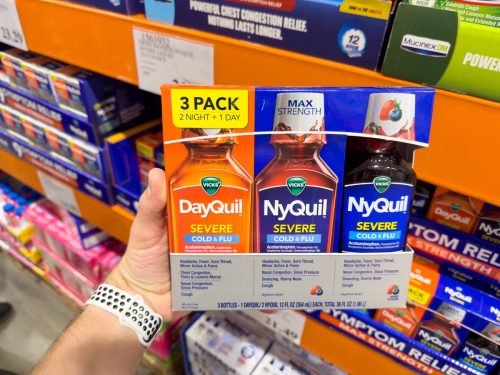
Phenylephrine is used to relieve nasal discomfort, sinus congestion, and pressure—both on its own and in combination with other medications, according to MedlinePlus. Sudafed PE is the most recognizable brand name for phenylephrine on its own, but the decongestant is also used in combination with other symptom relievers in many of the most popular common cold medications currently on the market.
The FDA panel’s presentation indicated that phenylephrine can be found in at least 250 products that generated nearly $1.8 billion in sales last year, The New York Times reported. This includes eight cold meds that you’ve likely used, per MedlinePlus: Advil Congestion Relief; Children’s Mucinex Multi-Symptom Cold; PediaCare Children’s Allergy and Cold; Robitussin Night Time Cough and Cold; Sudafed PE Cold/Cough; Tylenol Cold Multi-Symptom Nighttime; Vicks DayQuil Cold and Flu Relief; and Vicks NyQuil Sinex Nighttime Sinus Relief.
These meds may be at risk of being banned.
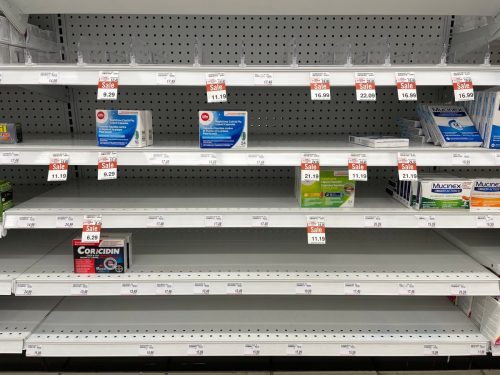
Now that the advisory panel has voted that phenylephrine is not effective, the ball is in the FDA’s court. The agency told the NDAC that it would take its advice into consideration, but did not give a timeline for when it would make its final decision, CNN reported.
The FDA is not required to follow recommendations from its advisory panels, but it usually does, according to The New York Times. So if the FDA decides to agree with the NDAC and revoke phenylephrine’s GRASE status, medications containing this ingredient could effectively be banned and pulled from stores shelves.
“We really should not have products on the market that are not effective,” NDAC committee member Diane Ginsburg, PhD, of the University of Texas at Austin College of Pharmacy, said in a statement following the vote, per CNN.
RELATED: Birth Control Pills Recalled Because They May Not Work, FDA Warns.
But officials haven’t questioned the safety of these products.
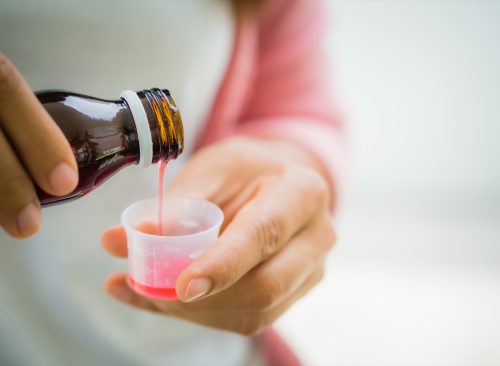
While we wait on the FDA’s final decision, experts have advised consumers not to go ahead and throw away all the cold medications in their medicine cabinet, according to The New York Times. The agency’s advisors said they do not think these products are dangerous to use, even if they contain the ineffective phenylephrine. Plus, other ingredients in the drugs can actually work to ease cold symptoms.
Instead, officials are simply worried about the costs or delays in care that consumers may experience when “taking a drug that has no benefit.”
“It’s amazing the amount of dollars being spent on something that has really no efficacy,” committee member William Fig, PharmD, a clinical pharmacologist and investigator at the National Cancer Institute, said in a statement, per CNN.
RELATED: For more up-to-date information, sign up for our daily newsletter.